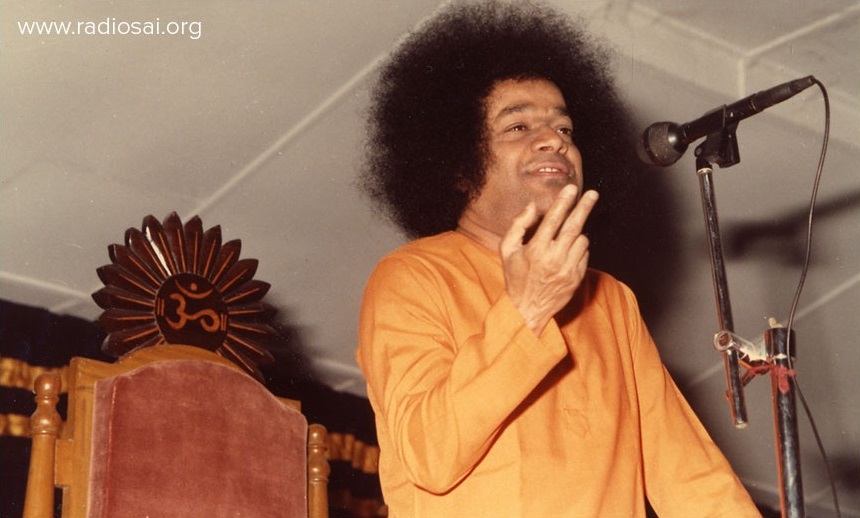
Sri Sathya Sai Speaks
Divine Discourses spanning 7 Decades (1950 – 2011)
Sri Sathya Sai Speaks, Vol 5 (1965) (Download)
October 1965 | Prasanthi Nilayam | Dasara
Sustained saadhana
It is an ancient observation – but, it is true even today – that man spends his childhood in pranks and play, his boyhood in sport and games, his youth in pleasure and pastimes, his middle age in plans and schemes to pile up a fortune, and his old age in hospitals and nursing homes trying to bolster up failing health by means of failing wealth. He has no time for anything ; his hands are too full. Earning and spending, he fills his time with work and worry. He has no peace, no spare time for sitting quiet in one . All appeals to him to pay attention to his essential needs for light and joy are in vain. Of what avail is illumination for a blind man. Of what avail is good counsel for the man who has closed his ears for things that really matter Man is busy with a number of attempts to earn happiness, but success is small and short-lived. He does not know the panacea for all his ills, the effort that will result in total victory: the control of mind, which is the master of the senses. Every sense is an outlet for the energy of man in a direction that binds him to the objective world. The senses are induced by the mind to move out and attach themselves to objects. Man must make the mind submit to viveka (wisdom), which discriminates between right and wrong and then, the mind will help him, instead of harming him.
Attachment is a disease
The body is the temple of God; He is resident in the heart; buddhi (intelligence) is the lamp lit in that altar; now, every gust of wind that blows through the windows of the senses affects the flame of the lamp and dulls its light, threatening even to put it out. So, close the windows; do not keep them open for dire attraction from objects. Keep buddhi sharp, so that it may cut the mind like a diamond and convert it into a blaze of light, instead of being a dull pebble. Discrimination, (Nithyanithyavasthu viveka), is an important instrument of spiritual progress. The reasoning faculty must be employed to distinguish between the limited and the unlimited, the temporary and the Eternal. That is its legitimate use. Shankaracharya names his work on the principles of Adhwaitha as “Viveka-chudamani”, for, he wanted to emphasise the value of Viveka for the realisation of the evanescence of life and the Oneness of the Universe. Attachment, affection, interest – these will create prejudice, partiality, illusion; they hide the Truth; they dull the intelligence. Raga is roga (attachment is a disease), so far as the enquirer is concerned. One does not become a yogi to have raga (affection); he must be free from favourites, fancies and fondness. Once you attach yourself to some person or habit or mannerism, it will be difficult for you to shake them off. Like the poor villager who jumped into the flood to salvage a bundle of rugs (really speaking, it was a bear being carried along by the raging waters), but found that the bundle caught hold of him so tight that he could not escape, man too jumps in, to retrieve what he considers a treasure, but is himself caught and bound. That is why the saints of this land have been teaching the people that they are children of immortality, repositories of peace and joy, of truth and justice, and masters of their senses. Of course, man can have some desires, some eagerness to achieve comfort, some attempt to earn content – but, it must be like the diseased man craving for medicine.
Hunger is the disease for which food is the medicine; thirst is the illness for which drink is the medicine. Food and drink, housing and clothing must be subsidiary to the needs of the spirit, the education of the emotions and passions and impulses. They must take the that salt and pepper take on the dining table today; uppu must be subsidiary to pappu; that is, salt must be little and dhal must be more; you cannot have more salt than the quantity of dhal, not even as much. So too; efforts to achieve health, comfort, etc., must be just enough for the purpose of sustaining the sadhana, not more, not less.
Express purity in your activities
There are some who always condemn themselves and their lives and aspire for the Grace of God to save them. Jeeva and Deva are two separate entities and never can they merge or unite, they declare. The obvious is very often untrue. Sin is not the real nature of man; it is acquired and can be shed. Man is pure, good, loving, wise. That is why in the Nilayam, I have stopped people from reciting shlokas which proclaim man as sinful, born in sin, revelling in sin, etc. Let the purity, which you are, get manifested; endeavour to express it in your activities; that is what pleases Me and wins My Grace.
You must expand your love to as wide a circle as possible. That is how kulabhimanam,mathabhimanam and deshabhimanam – affection for the community, the religion and the country – becomes desirable and commendable. If, instead of love, these create hatred of other communities, other religions and other countries, then, they become poisonous.
Pray for happiness of all mankind
Love your religion, so that you may practise it with greater faith; and, when each one practises his religion with faith, there can be no hatred in the world, for all religions are built on universal love. Love your country, so that it may become strong, happy and prosperous, an arena for the exercise of all the higher faculties of man. Feel that Delhi or Calcutta is as much a part of yourself as your own town or village; any pain in the toe is as much a matter of concern for you as a pain on the top of the head. Strive to make India strong and happy so that it may not be a drag on other countries, or even a temptation; she was once the Guru of Humanity. Let her assume that role again. Live therefore the life that will make you respected and revered as a child of Bharath, the life that will be an example and inspiration for all. Pray for even those who invade the land out of greed or hate; sympathise with their ignorance and pray that their steps may be directed towards truth, justice and love. Prayer has great efficacy. The Vedhic seers prayed for the peace and happiness of all mankind, of all animate and inanimate things. Cultivate that universal vision.
Prayer must emanate from heart, where God resides, and not from the head where doctrines and doubts clash.
– Sri Sathya Sai Baba
